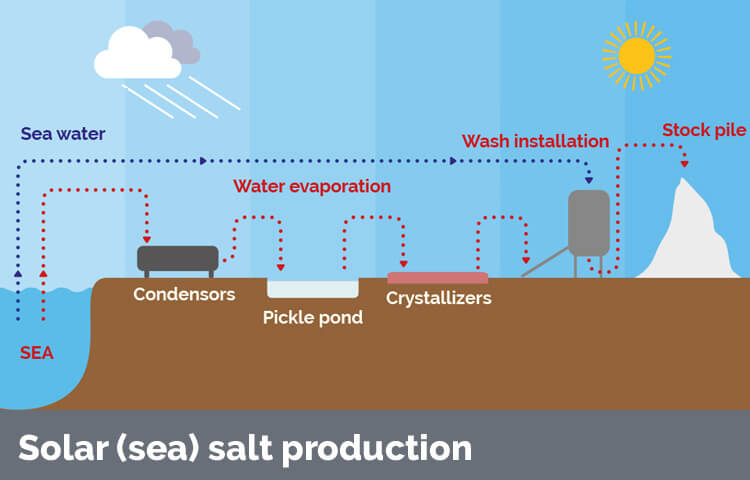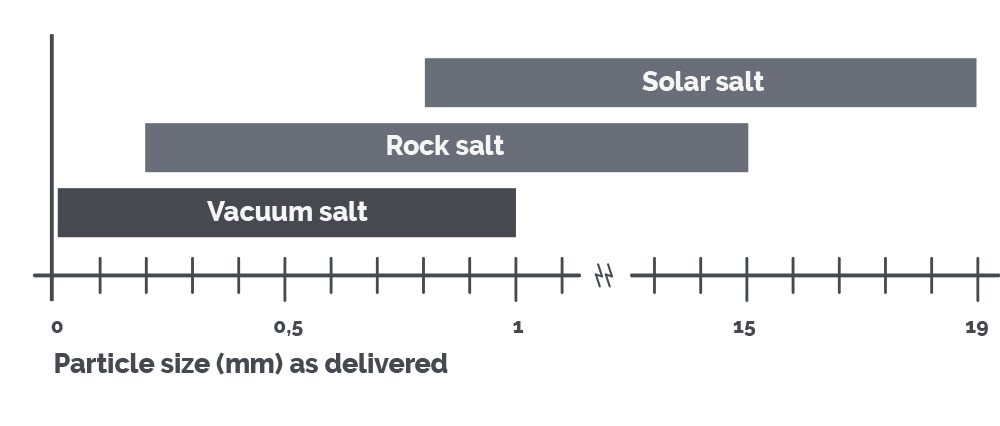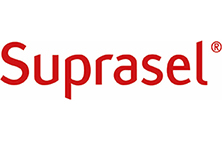
Home » Our story » Pure salt in food
Pure salt in food
Salt, or sodium chloride [NaCl], is an essential ingredient in food. We, as human beings, need salt.
- Salt is an essential nutrient
Our body can not produce sodium and chlorine, yet these components are essential to keep it healthy. Salt plays a vital role in the regulation of many bodily functions and is contained in body fluids that transport oxygen and nutrients. Sodium is also essential in maintaining the body’s overall fluid balance. - Salt improves taste
Salt is one of the basic tastes we have as humans. Seasoning with salt enhances the taste of food and makes common foods more palatable. - Salt acts as a food preservative
Even with the development of refrigeration, salt preserving of meat, fish and dairy remains an important aid to food hygiene. - Salt binds
Salt extracts proteins in processed meat, binding the meat together and reducing cooking losses. - Salt gives texture
Salt strengthens gluten in bread dough, providing uniform grain, texture and strength, allowing the dough to expand without tearing. It also improves the tenderness of cured meats, and develops rind hardness and even consistency in cheese. - Salt helps to control fermentation
In baked products, salt controls fermentation by retarding the growth of bacteria, yeast and moulds. This is important in making a consistent product and reducing the development of harmful bacteria.
Types of salt
Although, most people recognize salt as being an essential ingredient, little attention is given to the properties and functions of salt. While there is a considerable variety of different salt types available.
- Vacuum salt
Salt in underground layers is dissolved in water and pumped up as brine. After purification the salt crystallizes under vacuum.

- Sea salt
Salt present in seawater is being accrued by letting the water evaporate in saltpans on the beach.

- Rock salt
Mineral salt, produced by carving it from rock formations.

Critical salt characteristics
When choosing the right type of salt for your food application, the following characteristics are relevant.
- Adherence
When salt is being used on the surface of food products, the adherence of the particles to the food is important. Irregularly shaped salt crystals stick better to the surface. Adherence is specifically important in the following food applications: crackers, snacks, soups and sauces & spices. - Blendability
Salt is often used as one of the ingredients in prepared mixes. It can also play a role as carrier for other (semi) dry ingredients or additives. This calls for irregularly shaped and smaller salt crystals. Main applications are sauces and spices, dry soups, meat and bakery. - Compactability
Especially when salt is being used as a carrier of other food ingredients, it is important that the blend can be compacted. Compatibility is important in sauces and spices, dry soups and stock cubes. - Flowability
In the food industry salt often needs to be dropped down on the product uniformly: at a controlled speed for equal dosaging. Depending on the required flow rate, the salt must be able to flow freely and consistently at a specific rate. Low moisture is essential for free-flowing salt. Flowability is especially important in the production of sauces and spices, fish and snacks. - Grain size
For several food applications the size of the salt grains is a key element. Fineness and an equal grain size distribution are important. The finer the salt the more taste is obtained for the same amount of salt added. On average, the grain size of vacuum salt is smaller than rock and sea salt. The size of the grains is of main importance for: dairy, fish, sauces & spices and snacks. - Particle size distribution
Not only the average grain size of the salt is important, but also the distribution of the different sizes plays an important role. A consistent and narrow particle size distribution prevents de-mixing and ensures constant production parameters. It enhances a constant taste perception of your food products and supports constant solubility and mixing properties during the production process. As a consequence, the particle size distribution of the following food products needs to be highly considered during the production process: dairy, fish, sauces & spices and snacks.

- Purity
Impurities in the salt can have a major impact on the taste of your food. To a large extent the purity is determined by the type of salt, predominantly refined (vacuum salt) versus unrefined (sea salt, rock salt). Purity is of especially importance for: bakery, dairy, fish, meat, sauces & spices and soups. - Solubility
In the food industry, salt often needs to be dissolved in water quickly and consistently. This calls for irregularly shaped and smaller salt crystals. A homogeneous solution helps to obtain the best results, e.g. in meat, bakery, snacks, ready meals, canning, pickling and beverages.
Anti-caking agent for salt
In the 1950’s Suprasel® discovered and patented Fe(CN)6 as a very powerful and effective anti-caking agent for salt. Since then Fe(CN)6 is the standard anti-caking agent all over the world. Anti-caking means that adjacent salt crystals do not cement together. This is not the same as flowability of the salt. Free-flowing salt means it flows down without arching, sticking or other interruption. Free-flowing salt is probably non-caking but non-caking salt is not necessarily free-flowing. In Suprasel® Pure we leave out anticaking agent Fe(CN)6 while safeguarding free-flowability and caking properties.
Why choosing Suprasel® vacuum salt?
Suprasel® food salt is refined vacuum salt, which makes it the purest salt for food. Suprasel® vacuum salt has a very small range of particle sizes and a constant particle size distribution. This enhances a constant taste perception and optimal solubility and mixing properties in your process.
Suprasel® has salt production sites in Hengelo (the Netherlands) and Mariager (Denmark). The Hengelo manufacturing operation started as KNZ (NV Koninklijke Nederlandse Zoutindustrie) in 1918. The operation site in Mariager also includes a sales office which covers Denmark, Finland, the Baltic States and Russia, which makes it a unique site in northern Europe.

Hengelo/Mariager Salt Specialties is one of the world’s leading salt specialists, supplying high-quality products for different kinds of applications. We export our products to customers throughout the world. As a long-time recognized expert in salt, we guarantee the recommended quality for your application.
Hengelo/Mariager Salt Specialties is well known for strong brand names, such as Suprasel®, JOZO®, NEZO®, KNZTM, Sanal®, Broxo® and Broxomatic®.
- or read more about specifications & food businesses.
Contact
Cases
Jeanette Hansson, Lyckeby Culinar
“We have great confidence in them and always get very good service”
read more
Jeanette Hansson, Lyckeby Culinar
Niklas Korshag, Korshags Food smoke house
“Smoking our fish the efficient and sustainable way”
read more
Niklas Korshag, Korshags Food smoke house
Jarl Jørgensen, Funderholme Dambrug
“Salt as a miracle remedy for freshwater fish”
Jarl Jørgensen, Funderholme Dambrug
Lars Justesen, Rødkærsbro Mejeri
“It was Suprasel® themselves who suggested the solution in summer 2015, and already after a month it was implemented”
Lars Justesen, Rødkærsbro Mejeri
Carl Jakobsen, Danish Crown
“We have a good working relationship characterized by great flexibility”
read more
Carl Jakobsen, Danish Crown








